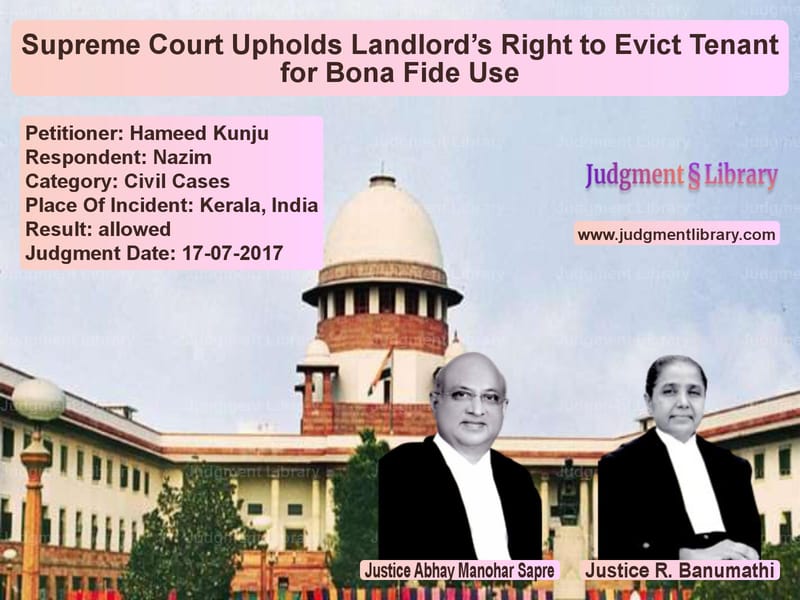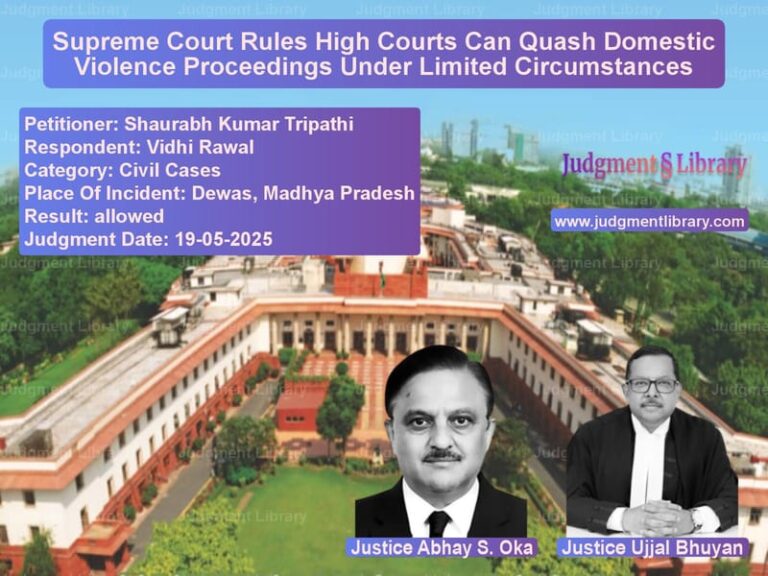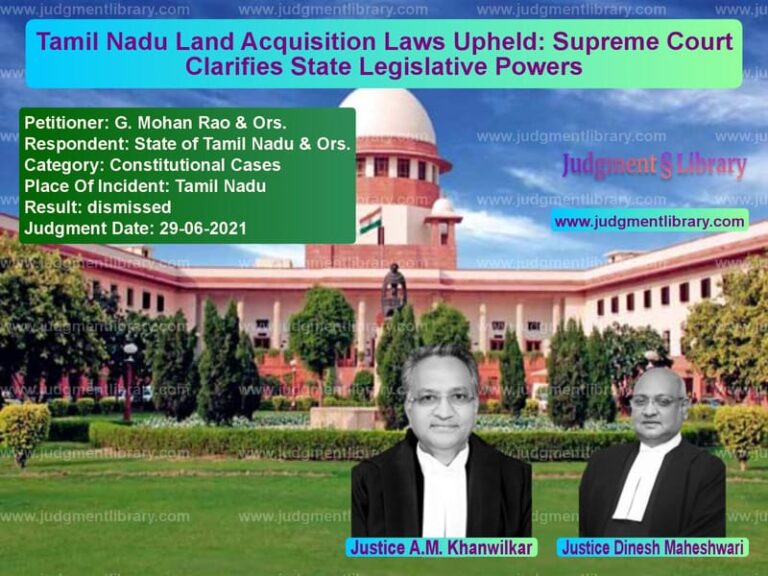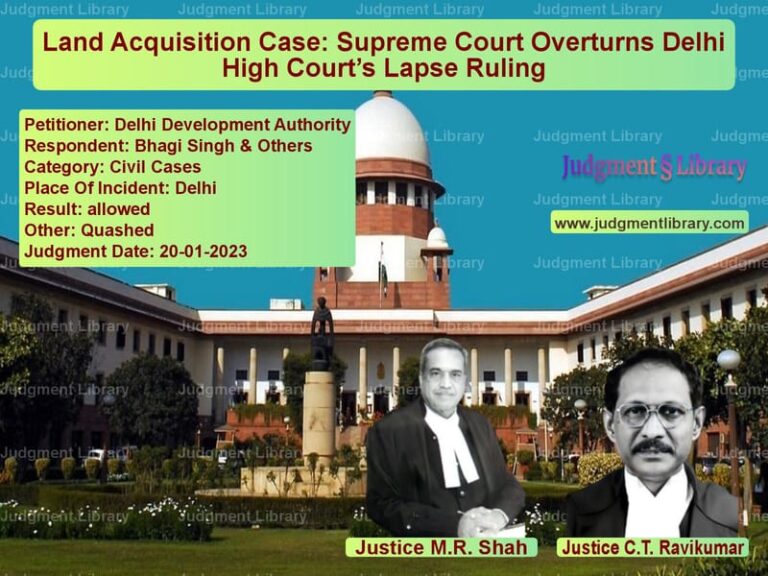Supreme Court Upholds Landlord’s Right to Evict Tenant for Bona Fide Use
In a significant ruling, the Supreme Court of India reaffirmed a landlord’s right to reclaim his property for bona fide personal use, directing the eviction of a long-standing tenant who had prolonged the litigation for over a decade. The case, Hameed Kunju v. Nazim, involved a dispute under the Kerala Buildings (Lease and Rent Control) Act, 1965, where the landlord sought to recover possession of a commercial property. The judgment underscores the importance of protecting landlords from unnecessary legal delays and ensuring that eviction proceedings are not misused by tenants to retain possession indefinitely.
Background of the Case
The case arose when Hameed Kunju, the landlord, filed an eviction petition against his tenant, Nazim, in 2006, citing non-payment of rent and a bona fide need for the premises. Kunju claimed that he intended to start a business in the shop occupied by Nazim. The Rent Control Court ruled in favor of the landlord in 2007, ordering the tenant to vacate the property.
However, the tenant challenged the eviction order before the Rent Control Appellate Authority, which remanded the case for fresh consideration. Following prolonged litigation, the Kerala High Court ultimately ruled in favor of the tenant, setting aside the eviction order. Dissatisfied with the outcome, Kunju appealed before the Supreme Court.
Arguments of the Petitioner (Landlord – Hameed Kunju)
The landlord, represented by legal counsel, made the following key arguments:
- He had filed the eviction petition based on genuine necessity, as he intended to use the premises for his business.
- The Rent Control Court had recognized his bona fide need and granted eviction accordingly.
- The tenant had continuously delayed the case by exploiting legal avenues to remain in possession.
- The High Court’s interference in setting aside the eviction order was unjustified.
- As the lawful owner of the property, he had the right to reclaim it for personal use.
Arguments of the Respondent (Tenant – Nazim)
The tenant opposed the eviction petition, arguing that:
- He had occupied the property for several years and made financial investments in it.
- The eviction petition was motivated by an ulterior motive rather than actual necessity.
- The High Court had rightly examined the evidence and ruled in his favor.
- The landlord’s claim lacked credibility, as there was no real urgency to reclaim the premises.
Supreme Court’s Analysis and Judgment
The Supreme Court reviewed the case in light of previous judgments and the legislative intent behind the Kerala Rent Control Act. The Court emphasized that the law was designed to protect tenants from arbitrary eviction, but it should not be misused to deny landlords their legitimate rights.
The Court made several important observations:
- The landlord had consistently asserted his bona fide need, which had been acknowledged by the Rent Control Court.
- The tenant’s attempts to delay the proceedings had caused undue hardship to the landlord.
- The Kerala High Court had erred in interfering with the eviction order without substantial grounds.
- The tenant had failed to provide sufficient evidence to challenge the landlord’s claim of necessity.
Referring to earlier judgments, the Supreme Court reiterated that the right of a landlord to reclaim possession for personal use should not be frustrated by procedural delays. The Court stated:
“The landlord has been engaged in litigation for over a decade merely to reclaim his own property. The delay caused by legal proceedings has deprived him of his rights as a property owner.”
Accordingly, the Court issued the following directives:
- The eviction order issued by the Rent Control Court was restored.
- The tenant was directed to vacate the premises within one month.
- Failure to comply with the order would lead to legal enforcement measures.
- The landlord’s right to reclaim his property was upheld as per the Kerala Buildings (Lease and Rent Control) Act.
Final Verdict
The Supreme Court allowed the landlord’s appeal, overturning the Kerala High Court’s decision and reinstating the eviction order. The ruling ensures that property owners are not unfairly deprived of their rights due to prolonged litigation.
Implications of the Judgment
This ruling has far-reaching implications for landlord-tenant relationships and eviction laws in India:
- Reinforces landlord rights: The judgment affirms that landlords have the right to reclaim their property for bona fide use.
- Prevents misuse of rent control laws: Tenants cannot indefinitely delay eviction proceedings to retain possession unlawfully.
- Encourages faster resolution: Courts are encouraged to expedite landlord-tenant disputes to avoid undue hardship.
- Sets a precedent: Similar cases in other states can now rely on this ruling to ensure fair outcomes.
This landmark judgment highlights the Supreme Court’s commitment to ensuring that rent control laws are not exploited to the detriment of property owners.
Don’t miss out on the full details! Download the complete judgment in PDF format below and gain valuable insights instantly!
Download Judgment: Hameed Kunju vs Nazim Supreme Court of India Judgment Dated 17-07-2017.pdf
Direct Downlaod Judgment: Direct downlaod this Judgment
See all petitions in Landlord-Tenant Disputes
See all petitions in Specific Performance
See all petitions in Damages and Compensation
See all petitions in Judgment by Abhay Manohar Sapre
See all petitions in Judgment by R. Banumathi
See all petitions in allowed
See all petitions in supreme court of India judgments July 2017
See all petitions in 2017 judgments
See all posts in Civil Cases Category
See all allowed petitions in Civil Cases Category
See all Dismissed petitions in Civil Cases Category
See all partially allowed petitions in Civil Cases Category







